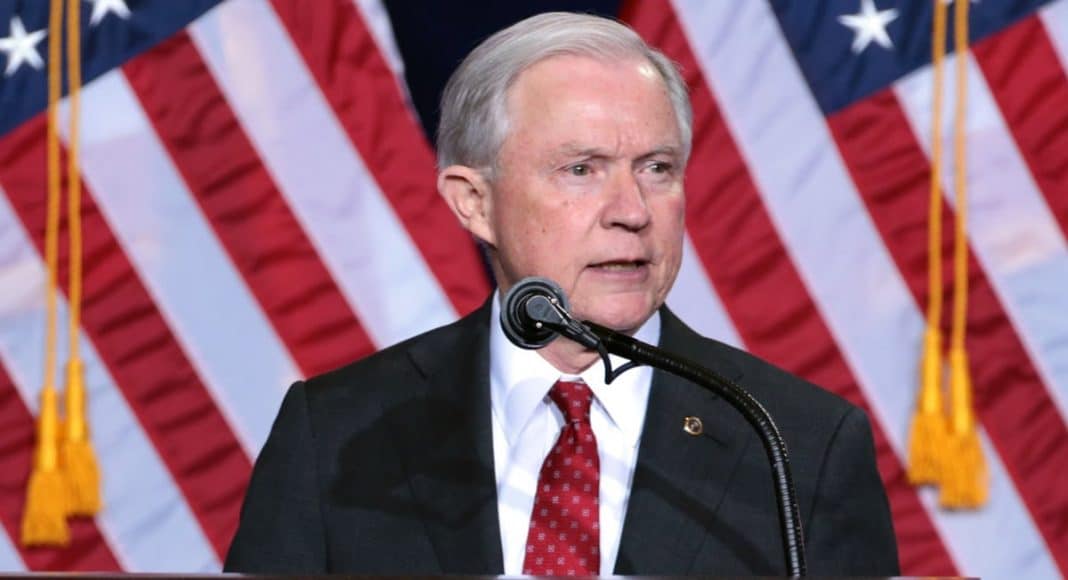It’s official whether you like it or not: Jeff Sessions on Wednesday was confirmed to be America’s top cop. No amount of hand-wringing or meme-sharing or angry outbursts will change the fact that the man who once said “good people don’t smoke marijuana” is the United States Attorney General.
So instead of lamenting the confirmation of Sessions, here are five positive things to focus on:
It’s About The Economy
Cowen and Company, a financial services research firm, projects that the marijuana retail industry will be worth about $50 billion in 10 years. That’s Billion with a capital B. And Cowen says that is a conservative projection! It is already a major economic engine employing more than 100,000 and generating millions in tax revenue. Why would a pro-business administration want to do away with this kind explosive industry growth?
Cowen and Company, a financial services research firm, projects that the marijuana retail industry will be worth about $50 billion in 10 years. That’s Billion with a capital B. And Cowen says that is a conservative projection!
“I’m hopeful that he’s enough of a capitalist to at least see the economic benefits this has provided to the various states in addition to the social justice and medical benefits,” said Jeff Zucker of Green Lion Partners, a cannabis business strategy consultancy.
All Politics Is Local
Eight states have already defied federal law and have legalized adult recreational use of cannabis and 29 states have some form of medical marijuana program in place. Cities have taken it upon themselves to decriminalize possession and make cannabis offenses the lowest law enforcement priority.
The is not to say that a federal mandate would not disrupt the status quo, but you can safely bet that state and local governments will fight back.
Also, reach out to your state and federal representatives. Marijuana policy reform is now a bipartisan issue. In fact, Republican Congressman Dana Rohrabacher of California introduced legislation in the U.S. House of Representatives this week that would resolve the conflict between state and federal marijuana laws and allow states to determine their own marijuana policies.
The Respect State Marijuana Laws Act exempts individuals and entities from certain provisions of the Controlled Substances Act if they are acting in compliance with state marijuana laws. This is the third time Rohrabacher has introduced the bill. Twenty of his colleagues in the House, including seven Republicans, co-sponsored the Respect State Marijuana Laws Act of 2015, which was introduced in the 114th Congress.
“The call for federal marijuana policy reform is growing louder and louder,” said Don Murphy, MPP director of conservative outreach. “Congress needs to listen to their constituents and to state lawmakers, most of whom agree marijuana policy is an issue best left to the states. This is a bipartisan solution that ought to find support on both sides of the aisle.”
Science Matters
Cannabis is a medicine for veterans suffering from PTSD. And young children with severe epileptic conditions. And seniors with intractable pain. The list goes on and on. These — and many, many more ailments — are all medical conditions that “thousands of years of history, tens of thousands of research studies and modern experience with millions of patients are proven to be relieved with botanical cannabis,” Dr. David Bearman wrote on Huffington Post.
These can’t be the people Sessions was referring to when he said “good people don’t smoke marijuana.”
There is a growing list of studies demonstrating the clear efficacy of medical marijuana. More than 150 medical organizations including the American Medical Association, American Nurses Association, American Public Health Association and American College of Physicians, endorse the medical use of cannabis.
Read The Memos
Under Barack Obama, the Justice Department ordered law enforcement to refrain from meddling with state marijuana laws. Federal officials were not allowed to intervene unless:
- Marijuana was being sold to minors.
- Sales of the herb was funding illegal activities.
- It was being transported across state lines.
These informal rules were issued in a memorandum known as the Cole memo, authored by former Deputy Attorney General James Cole.
During the Senate Committee confirmation hearing, Sessions was asked if he would follow the Cole Memo. His response was telling: “If I am fortunate enough to be confirmed as Attorney General, I will certainly review and evaluate those policies, including the original justifications for the memorandum, as well as any relevant data and how circumstances may have changed or how they may change in the future.”
Sure, Sessions could toss the memoranda in the circular file. But until he does, the policy is in force.
The People Have Spoken
Support for marijuana legalization has never been higher. Last year, a Gallup Poll revealed that 60 percent of Americans want the plant legal.
When Gallup first asked this question in 1969, only 12 percent of Americans supported the legalization of marijuana use. In the late 1970s, support rose to 28 percent but began to retreat in the 1980s during the era of the “Just Say No” to drugs campaign. Support stayed in the 25 percent range through 1995, but increased to 31 percent in 2000 and has continued climbing since then.
“It would be political suicide for the Trump Administration to go against a campaign promise on a hugely popular issue that won even among their demographic,” said Troy Dayton, CEO of the ArcView, a cannabis research firm.
And Tom Angell of Marijuana Majority says: “A clear majority of Americans support legalizing marijuana and super-majorities across party lines believe that states should be able to implement their own cannabis laws without federal interference. The truth is, marijuana reform is much more popular with voters than most politicians are, and officials in the new administration would do well to take a careful look at the polling data on this issue before deciding what to do.”


